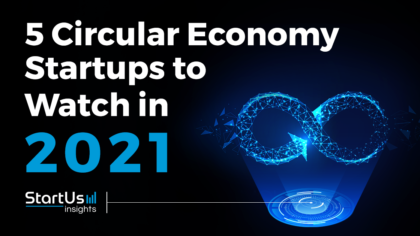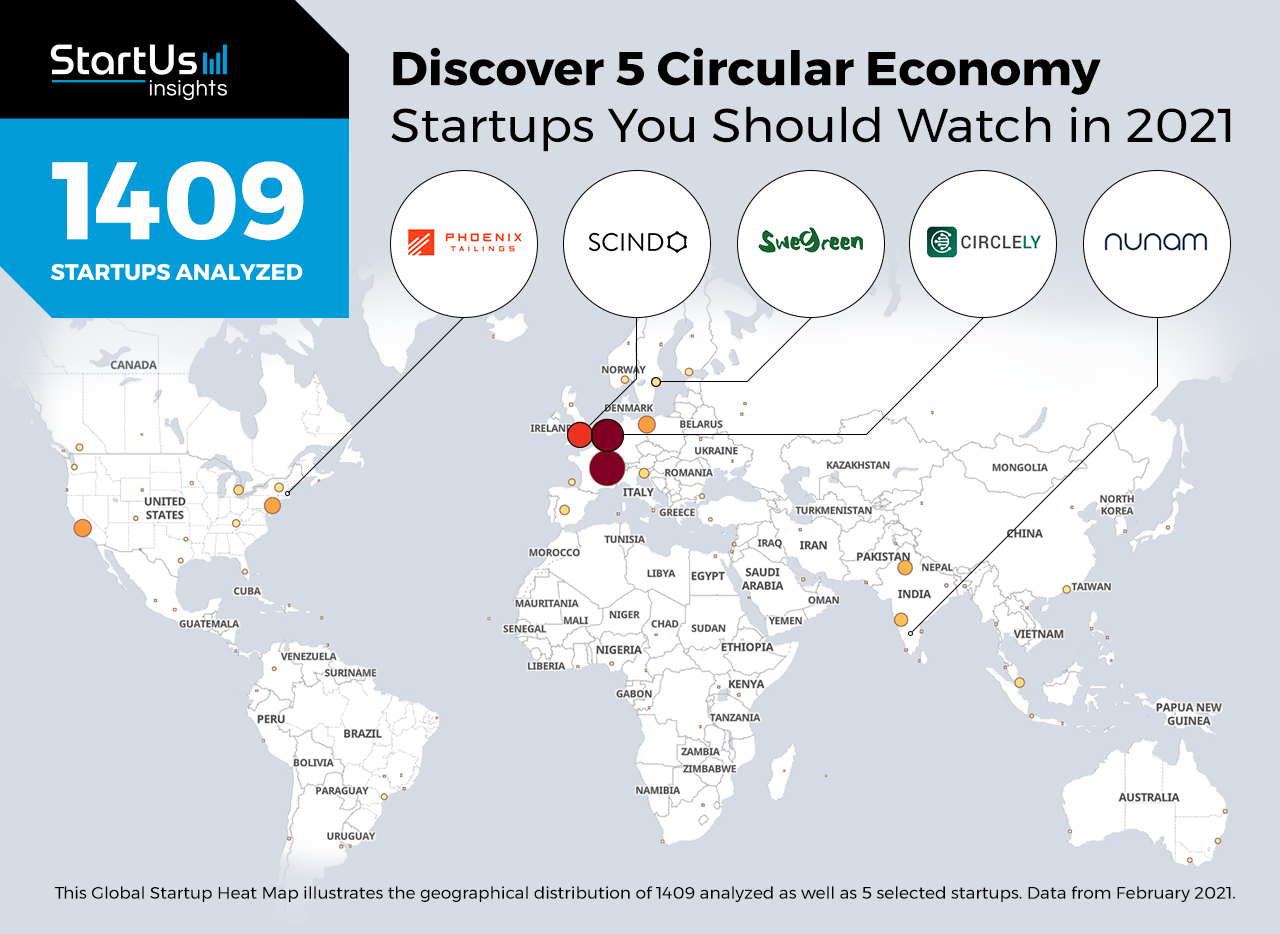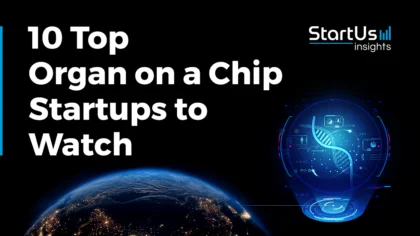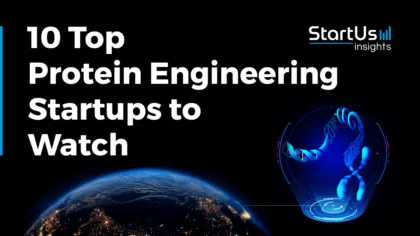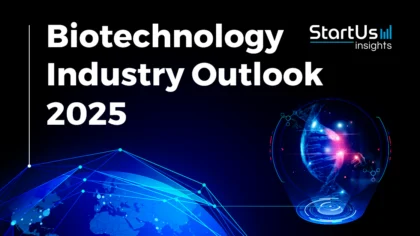Accelerate Productivity in 2025
Reignite Growth Despite the Global Slowdown
Despite the challenges caused by the COVID-19 pandemic and increasing economic uncertainty, new startups are founded every day. To introduce you to 5 recently founded circular economy startups, we analyzed 1.409 startups in the field. All of them develop innovative solutions spanning from plastic recycling to re-mining and second-life batteries.
The 5 promising circular economy startups you should watch in 2021 were hand-picked based on our data-driven startup scouting approach, taking into account factors such as location, founding year, and relevance of technology, among others. The 1.409 companies that were analyzed for this report are identified using the StartUs Insights Discovery Platform, covering 1.379.000+ startups & scaleups globally. When you are looking for up-to-date solutions for your innovation units, R&D, or product development department, the StartUs Insights Discovery Platform gives you the most exhaustive collection and ensures you continuously discover new startups, scaleups, and technologies.
Global Startup Heat Map: 5 Circular Economy Startups to Watch
The Global Startup Heat Map below highlights 5 circular economy startups developing technology-driven solutions for different industries. Moreover, you can explore global hotspots for circular economy startups and even download this graphic to include in your next presentation.
Scindo offers a Plastic Recycling Solution
 Plastics are non-biodegradable and often end up in landfills or require incineration. Plastic recycling is also difficult and complex due to the large variety of plastic types. Even when recycled, plastics lose value after each performance cycle. Circular economy solutions, on the contrary, upcycle plastics into valuable materials while reducing emissions.
Plastics are non-biodegradable and often end up in landfills or require incineration. Plastic recycling is also difficult and complex due to the large variety of plastic types. Even when recycled, plastics lose value after each performance cycle. Circular economy solutions, on the contrary, upcycle plastics into valuable materials while reducing emissions.
Scindo is a British cleantech startup that recycles plastics that aren’t efficiently recyclable with current methods. The startup uses enzymes to convert plastics into high-value molecules for use in various industries such as chemicals, biotech, and pharma. By making plastics biodegradable, it provides an alternative to incineration and landfills, enabling a circular economy.
Nunam enables Battery Reuse
 There is an upsurge in the use of lithium-ion batteries for new energy applications, such as electric vehicles. After the performance of these batteries falls below the first-life use, they are repurposable for less energy-intensive applications in their second life. Startups are developing new applications for used batteries, as well as material recovery solutions for end-of-life batteries, to advance circularity.
There is an upsurge in the use of lithium-ion batteries for new energy applications, such as electric vehicles. After the performance of these batteries falls below the first-life use, they are repurposable for less energy-intensive applications in their second life. Startups are developing new applications for used batteries, as well as material recovery solutions for end-of-life batteries, to advance circularity.
Indian startup Nunam builds energy storage devices with used batteries. The startup’s device incorporates second-life lithium-ion batteries and an intelligent battery management system (BMS). It also utilizes data analytics and cloud computing to track the entire battery lifecycle from procurement to recycling. The startup is deploying its battery as a source of clean and affordable energy for fruit and vegetable vendors.
Phoenix Tailings provides Re-Mined Products
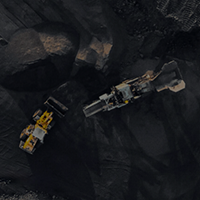 The metal processing and mining industry generate large amounts of waste, such as mine water, water treatment sludge, and waste rocks. Startups are developing solutions that extract valuable materials from mining waste, leading to new revenue streams without additional emissions. These materials enrich other processes in the industry or provide sustainable materials for other industries, such as construction.
The metal processing and mining industry generate large amounts of waste, such as mine water, water treatment sludge, and waste rocks. Startups are developing solutions that extract valuable materials from mining waste, leading to new revenue streams without additional emissions. These materials enrich other processes in the industry or provide sustainable materials for other industries, such as construction.
Phoenix Tailings is a US-based startup that provides re-mined products. The startup’s proprietary re-mining technology extracts high-quality metal from mining tailings, reducing production costs. It provides aluminum, alumina, iron, titanium, titania, silica, as well as rare earth metals, for a wide range of industries, including automotive, MedTech, and chemicals. The startup’s process produces no waste or carbon emissions and enables a circular economy.
SweGreen facilitates Urban Farming
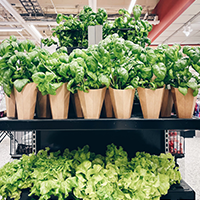 To tackle emissions and decrease dependence on long supply chains, cities are turning to grow agricultural produce locally. However, a lack of free space in urban areas means that vertical farming is often the only viable option. Urban farming startups combine sustainable technologies like hydroponics, food waste utilization, and controlled environments to promote circularity in their operations.
To tackle emissions and decrease dependence on long supply chains, cities are turning to grow agricultural produce locally. However, a lack of free space in urban areas means that vertical farming is often the only viable option. Urban farming startups combine sustainable technologies like hydroponics, food waste utilization, and controlled environments to promote circularity in their operations.
Swedish startup SweGreen develops vertical farming solutions for urban farming. The startup uses AI and sensors to monitor the controlled environment, generating valuable insights for better yields. It offers farming-as-a-service, allowing consumers to have access to hyper-locally produced leafy greens. The startup uses a circular system that recycles most of the water, as well as reduces carbon emissions.
Circlely develops a Product Referencing Platform
 Linear businesses usually don’t have a strong incentive to reuse, remanufacture, or extend the life of products. The costs involved in the collection and waste processing of these items generally do not justify the resale of end-of-life products. As a result, many manufactured products, such as gadgets, are simply disposed of inexpensively at end-of-life. Circular economy startups are developing local collection and distribution channels to address this.
Linear businesses usually don’t have a strong incentive to reuse, remanufacture, or extend the life of products. The costs involved in the collection and waste processing of these items generally do not justify the resale of end-of-life products. As a result, many manufactured products, such as gadgets, are simply disposed of inexpensively at end-of-life. Circular economy startups are developing local collection and distribution channels to address this.
Circlely is a French startup developing a product referencing platform. The platform enables distributors and retailers to sell end-of-life products via local omnichannel distribution. It digitizes product data to share information with customers and local social networks. The startup facilitates a circular economy by reducing the waste of manufactured products and distributing unsold items locally.
How will the Circular Economy impact your company?
To stay ahead of the technology curve, it is important that you know which technologies and industry trends will impact your company. Explore our free Industry Innovation Reports or let us do the work for you. To keep you up-to-date on the latest technology and emerging solutions, we provide you with actionable innovation intelligence – quickly and exhaustively.
